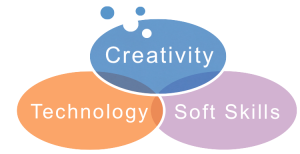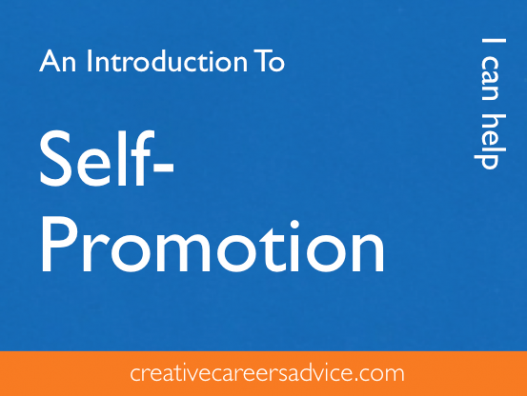As creatives, designers and visual communicators we may just think our portfolios will be enough to promote ourselves and attract adequate attention from potential employers. But it's only a part of what you need to gain that all important 'visibility'. This introduction to self promotion will focus on some initial steps you can consider.
The Winning Skills Combination
Ultimately it is not enough just being aware of what employers are looking for.
Your next steps are to demonstrate the knowledge and experiences you have in an effective personal promotion campaign that uses multiple platforms.
Industry Creatives’s are increasingly looking out for that winning combination. So wherever or whenever you’re promoting yourself, make sure these three important skillsets below are an integral part your pitch strategy…

Platforms for Self-Promotion
Illustrating your USP, (unique selling points) across strategically selected multiple-platforms that align and communicate with your target audience. Creating an effective self promotional 'campaign' should consider communication across: multiple platforms, face-to-face conversations, blogs, posts & videos on social media platforms, in public speeches, even through our mannerisms, posture, speech, or dress. For visual communicators - finding suitable devices and platforms is essential to display content and sell ourselves.
The answer to good effective marketing is holistic and not just using a single device or platform. We can learn how to advertise ourselves from the way marketeers and advertisers brand and promote products & services in the commercial arena.
“Branding a product, means to impose a personality, character and heritage, ultimately influencing the way it is perceived by the public”
Steven Heller, Art Director & Author
See how you might apply those attributes in the following personal promotional media:
SHOWCASING RELEVANT SKILLS IN YOUR PORTFOLIO
- Illustrating your expertise required to do a job through relevant projects.
- Demonstrating your creative & technical skills in the description of your project & processes, using industry related language to tell the story.
- Use some of these keywords in the description of your ‘About Me’ as you communicate your personality, character and heritage to your desired audience.
DEMONSTRATING STORYTELLING SKILLS FOR YOUR SHOWREEL
- Exercising your short-form visual narrative animation & editing skills.
- Showing the importance of sound design and audio skills
- Demonstrating the power of the moving image in your promo strategy.
CREATING A MARKETING STRATEGY FOR YOUR ONLINE & SOCIAL MEDIA PLATFORMS
Promoting on social media helps work towards gaining a substantial presence on these platforms - but this involves consistency - maintaining a regular updated presence as an integral part of your social media campaign activity.

- Create your brand identity using your logo to personalise your brand.
- Create your profile information: your brand identity, name, logo, portrait (if appropriate) and description of you and your skills
- Decide what you want to promote and the most suitable social media outlets.
- Understand who’s your target audience. If mainly employers - where do they search and what do they want to see.
- Ensure you adapt your promotion to each particular platform and its audience.
For instance, here are some platforms we all know but you may not use or are using effectively as part of your promotional campaign:

LinkedIn The networking platform that gives you access to business, companies, positions and individuals in the industry. Create a profile that reflects your current situation, skills and competencies. Be honest and accurate - if your a student, or recent graduate, say so. Join groups and forums, tune in to blogs and posts and start interacting where you feel you have the knowledge and interest to do so.
Instagram & YouTube Visually-based platform - photos and videos to self-promote, making good use of appealing to the visual community looking for creative talent. Ideal for increasing visibility and brand awareness through video creation that can be shared on other platforms.
Facebook As a prominent social media platform use the wide user base to encourage awareness of you and your brand.
Tick Tock For visual imagery & videos. This is popular among Generation Z users, so as you'll be targeting industry professionals, recruiters and employers - this might not be the platform to use for your promotion.
Top Tips
- Keep the accounts active and updated. But don’t ‘over share’. It’s not about the numbers. Manage your posts with tools like Tweetback: https://tweedback.de/
- Choose appropriate business and industry related communities to join.
- Be a blogger/vlogger as creating original content helps rankings and demonstrates passions, knowledge and skills to browsing employers and recruiters.
- You may be a recent graduate but you now are promoting yourself as a entry-level creative, starting to immerse yourself in the professional world, so use their language.
- Don’t confuse your social media accounts with your business platforms. They are very different. Employers and recruiters check out your social media accounts, so be sure they aren’t detrimental to your employability chances.
Demonstrating Your Competencies (Skills & Behaviours) in Job Applications
(See my Blog: 'The Approach to Creative Job Applications - CVs, Covering Letters' and 'The Approach to Creative Interviews')
ADDING RELEVANT SKILLS TO YOUR CV
- Highlighting your knowledge & expertise required to do a job.
- Demonstrating your knowledge & experience of specific software and hardware applications.
- Illustrating your design skills.
- Use some of these keywords in the description of your work history.
HIGHLIGHTING SKILLS IN YOUR COVER LETTER
- Remember, the covering letter serves a different purpose to your CV. It's a brief, conversational introduction to you and how you match the requirements.
- It should compliment not duplicate the CV.
- Use a narrative structure device to give specific examples of a time when you demonstrated those skills they list in the job specification. Be succinct and specific.
USING SKILL WORDS IN YOUR JOB INTERVIEW
- Familiarise yourself with the type of industry language your interviewers use.
- Have at least one example for a time you demonstrated each of your top skills.
Conclusion
To re-cap on that opening set of values that help determine what creative industry employers look for in a potential candidate and a useful benchmark for you to follow…
a curious mind and great ideas;
the passion to inspire & inform, create, present & communicate,
with originality, self confidence, adaptability, understanding
and a love of working with people and the craft
We’ve seen that employing the 3-point skillset guide ensures you always cover all areas of your abilities in your portfolios and multi-platform promotion.

All three areas are important, but people with original ideas and creative innovation will attract the most attention, with your tech skills coming a close second…
Alongside your projects and technical abilities by using effective communication and powers of persuasion you can ‘verbalise’ your enthusiasm and enjoyment of the creative craft. And by demonstrating those soft skills at every stage of the recruitment process, you will connect 100% more successfully with your audience - increasing your employability and chances of securing that dream job… that’s a certainty.
All photographs in this blog are courtesy of: Unsplash - https://unsplash.com/
© Paul Butler is Creative Careers Adviser, Design Director and HE Lecturer in employability and Creative Industry careers.
For one-to-one creative careers advice and coaching contact me at: paulb@creativecareersadvice.com
If you found this blog useful share it with your contacts and follow me for more posts on creative careers advice and employability topics.
Related articles: 'Confidence In Public Speaking' and 'Pitch & Presentation'
Why not sign up for membership of Tern Heads: https://ternheads.com/ A creative community of peers and professionals, dedicated to entry-level talent. We offer a network of accessible opportunities and a space to showcase your work to potential employers.
